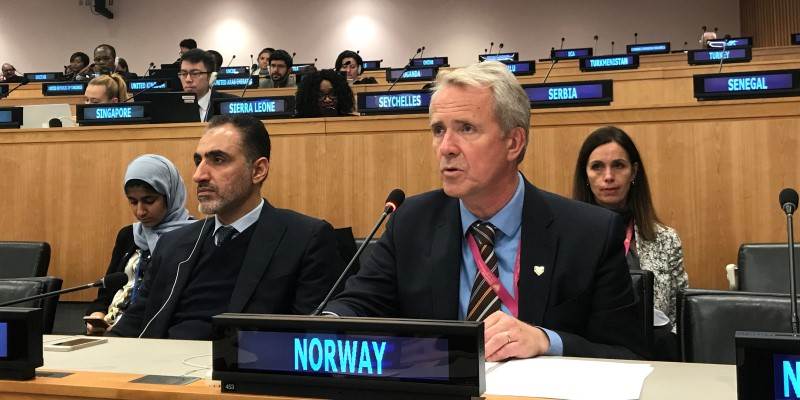Multilateralism is under pressure, as are the norms that underpin it. We need to defend the multilateral system and the rules-based multilateral order, which we have all benefitted from.
The 2030 Agenda requires transformative change. It paves the way for new and strategic partnerships and it provides an opportunity to make the UN system, particularly the Development system, better fit for purpose. We therefore need to move towards implementation of the UN Development System reforms without any delay.
The prime responsibility for implementing the 2030 Agenda rests with member states. The UN development system has also an important role in supporting national governments in their efforts to achieve the Sustainable Development Goals. We need a UN Development System that is results-oriented, strategic, coordinated and focused. A system that does «the right things» in «the right place».
The Resident Coordinator system will be key to ensuring that the UN assists host countries in a coherent, integrated and efficient manner towards their implementation of the 2030 Agenda.
Funding itself can be a driver – or an impediment - for change. Core resources remain crucial, especially to fund normative functions and policy advice. Likewise, we need more use of other flexible funding modalities; as well as inter-agency funding mechanisms that provide incentives for UN entities to work together.
We must also understand the linkages between security and sustainable development.
Chair,
The Norwegian level of development assistance – currently allocated at 1 per cent of gross national income – continues to enjoy broad political and popular support in Norway. Norwegians are proud to be among the top contributors to the UN development system.
As a founding member, for more than seven decades now Norway has been a consistent partner of the United Nations. We are fully committed to the Funding Compact, and will continue to be a top provider of core funding to the system.
The Norwegian Government has budgeted to maintain its high level of support to UNDP, UNICEF, UNFPA, UNHCR, UN-Women and WFP.
Burden sharing is an important multilateral principle, and we encourage other Member States to also commit to bringing core resources to a level of at least 30 percent in the next five years.
The Norwegian Parliament is yet to finalize the budget for 2020. So all the following figures are subject to parliamentary approval. However, in this context, Norway is pleased to present some of our proposed voluntary core contributions for 2020:
- UNDP: 555 million NOK in core support (approximately 61 million USD )
- UNICEF: 410 million NOK in core support (approximately 45 million USD )
- UNFPA: 530 million NOK in core support (approximately 58 million USD)
- UNHCR: 380 million NOK (approximately 42 million USD)
- WFP: 300 million NOK (approximately 33 million USD)
- UNRWA: 125 million NOK (approximately 14 million USD)
- UNAIDS: 60 million NOK (approximately 7 million USD)
- UN-Women: 100 million NOK (approximately 11 million USD)
Norway will in 2020 contribute substantially to the Special Purpose Trust Fund for the Reinvigorated Resident Coordinator System and the Joint Fund for the 2030 Agenda.
We will also continue to provide substantial support for humanitarian and human rights purposes:
- In 2018, we signed a four-year agreement with Central Emergency Trust Fund (CERF), totalling 1.68 billion NOK (almost 200 million USD).
- We also signed a four-year agreement with the Office of the High Commissioner for Human Rights (OHCHR) in 2018, totalling 660 million NOK (approximately 72 million USD).
- From 2019, we have committed core support to the Office of the Coordination of Humanitarian Affairs (OCHA) for a three-year period. The minimum annual contribution is NOK 70 million (approximately 8 million USD), with the intention of contributing NOK 90 million annually (approximately 10 million USD).
Human rights, gender equality and empowerment of women and girls will continue to be at the core of our development policy.
As in previous years, Norway will provide global and country-specific non-core funding to individual organizations, mainly in the form of softly earmarked contributions. A substantial part of these will go to inter-agency pooled funds and joint programmes, such as the Peacebuilding Fund, in line with the integrated approaches called for in the 2030 Agenda.
Finally, Norway provides substantial funding to global thematic funds and initiatives for education and health where the UN is actively engaged and benefits financially.
Chair,
In conclusion, I would like to take this opportunity to thank the UN development actors, in particular locally employed staff, for the work they are doing every single day. Let me assure you once again that Norway is, and will continue to be, a strong and consistent partner- for our common future.
I thank you.
